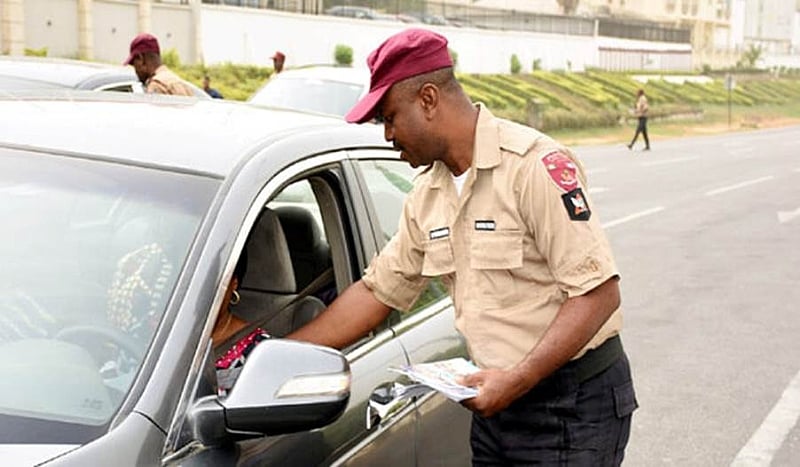It is not news any more that the condition of traffic in Nigeria today has become more notoriously chaotic than it had been over so many years. In cities like Lagos, Abuja and Port Harcourt, traffic congestion, illegal parking, plying against one-way roads and a flagrant disregard for pedestrian rights have become intractable. According to the Federal Road Safety Corps (FRSC), thousands of lives are lost annually in road accidents, many of them from avoidable violations of traffic laws. Despite the presence of traffic regulations and agencies tasked with law enforcement on our roads and highways, poor implementation remains the major challenge.
Several factors may have contributed to this situation. First is that traffic enforcement officials have often been known to accept bribes and allow offenders to escape justice. This was not the standard when the institution was inaugurated on 18 February 1988. Gradually but steadily, the organisation began to get corrupt like all the other agencies of government. Second is that there are not yet enough trained personnel to cover the volume of vehicles that ply daily on Nigerian roads. Third is that, possibly, many citizens, especially those who live in the rural areas, are unaware of the existence of traffic laws or they view them as unnecessary burdens.
In addition, on most roads, even in metropolitan cities, a lack of clear road signage, poor road conditions, and inadequate pedestrian infrastructure contribute significantly to traffic violations. Therefore, rebuilding Nigeria’s ethical landscape must start with consistency in law enforcement. If the government is serious about instilling discipline in our communities, then it must ensure that obeying traffic laws is non-negotiable. Citizens must understand that every act of road indiscipline, no matter how seemingly small it is, has substantial consequences on the values of our communities.
Discipline on Nigerian roads has indeed become an imperative. It is not just about safe driving. In essence, it is a reflection of our community values. Respecting and enforcing traffic laws cultivate an atmosphere of mutual respect, order and consequent safety. Conversely, when road users ignore traffic rules and road signs with impunity, it fosters a culture of indiscipline that transcends into our homes, our schools, our workplaces and our communities. Nigeria, with its growing population and increasingly congested cities, must avoid the high cost of loose traffic-law enforcement. The issue is not simply about preventing accidents. In a more serious sense, it has to do fundamentally with rebuilding the moral and ethical fabric of the country through the daily practice of orderliness and accountability on our roads, which transmutes into the lifestyles of citizens.
Whether the Nigerian authorities know it or not, roads are one of the most common places where citizens interact with the law on a daily basis. Traffic rules serve as a tangible and visible form of governance that everyone, irrespective of social status, is expected to obey. When people witness lawlessness on the roads such as government officials driving against traffic, running red lights, or business people bribing traffic officials, they internalize the message that laws are flexible and consequences can be bypassed. This attitude clearly undermines the credibility of the state government and the values of community discipline.

In other words, the behaviour exhibited on the road by commuters can psychologically influence individual citizens. When commuters see others violating traffic laws without repercussion, they are encouraged to follow suit. Over time, this situation creates a norm of impunity. Children who observe such behaviour from adults, particularly from parents or school bus drivers, learn that flouting rules is acceptable. And in a very significant way, the foundation of discipline in homes and schools becomes weakened.
The point is that indiscipline on our roads is a reflection of indiscipline in our homes and institutions. In workplaces, the same people who disregard road signs will also ignore office policies, deadlines, and professional ethics. In schools, educators and students will adopt a cavalier attitude toward rules if community norms indicate that rules are not enforceable. The net result is a weakened institutional culture where shortcuts are preferred to due processes. But let us not forget that communities are built on shared values, and one of its most critical values is mutual respect. Traffic indiscipline leads to chaos, road rage, and even violence that breeds a hostile environment. When communities witness the breakdown of law and order on our roads, it reflects a broader disintegration of communal cohesion, making collective efforts like neighbourhood security or sanitation campaigns more difficult to grapple with.
But more importantly is the fact that children are keen observers. A society that consistently upholds traffic laws sends a strong message to its youths about the importance of rules, regulations and responsibilities. This shapes a future generation that values order, accountability and justice. When traffic laws are applied equally to all, from the common motorcyclist to the wealthy SUV owner, it reinforces the idea that no one is above the law. This understanding can help restore trust in governmental institutions and their ability to serve all citizens fairly.
These are some of the reasons why the Federal Road Safety Commission should now wake up from its deep slumber and get back to work. Road accidents not only claim lives, they also have a massive economic impact in terms of medical bills, property damage, and productivity loss. Effective enforcement of traffic laws can significantly reduce these incidents. Traffic congestion also wastes valuable man-hours. By enforcing laws that regulate traffic flow, such as bans on illegal parking and proper lane discipline, the government can ease congestion, and in that way, improve national productivity.
We should not forget also that investors look for stable and orderly environments. A country where basic traffic laws are not obeyed and not enforced is generally seen as unstable or chaotic, and this can deter potential investors. This is more so because areas with traffic chaos are often breeding grounds for criminal activities such as theft, pick-pocketing, and assaults. Better and more professional enforcement would normally lead to more orderly environments, making it easier to detect and deter crime. Again, emergency services such as ambulances, fire brigade and police vehicles are often hindered in the process of their duties by unregulated traffic. Therefore, strict law enforcement will ensure that emergency lanes are respected and that response teams can function seamlessly.
And so, there is urgent need for the Nigerian government to queue now to go digital with its roads. The government should be able to install traffic cameras, automated ticketing, and digital records to reduce human corruption. These systems can serve as objective witnesses to traffic violations and ensure transparency. Also, there must be continuous education about the importance of traffic laws through schools, religious institutions, and the media. People need to understand why traffic laws are very important. By the same token, officers must be trained not just in traffic management but also in the ethics of their profession.
Incentives and good working conditions can stimulate the appetite for hard work and reduce the temptation for corruption. Like it is done in many advanced countries, local community groups should also be involved in traffic management. Initiatives like “neighbourhood traffic watch” can complement formal enforcement. The government, above all, must ensure a legal system that supports quick adjudication of traffic violations. Fines must be significant enough to deter wrongdoing. The government must show unwavering commitment. This includes not shielding political allies or influential persons from prosecution when they break traffic laws.
The Nigerian government stands at a critical juncture right now because, at the end of the day, enforcing traffic laws is not simply about managing roads. More importantly, it is about setting the tone for disciplined and functional communities across the states. Roads are the stage upon which the daily play of law and order is acted. If Nigerians consistently indulge in flouting traffic laws without consequences, they internalize the broader message that rules do not matter. But if they embrace discipline, order, and fairness on our roads, these values will gradually filter into our homes, schools, workplaces and the communities eventually. Those of them in government who studied abroad in Europe should have known this little “secret”. Enforcing traffic laws with seriousness and consistency is a foundational step towards rebuilding national character, fostering respect for the rule of law, and steering the country toward a more responsible and prosperous future. And the federal government must understand this.


